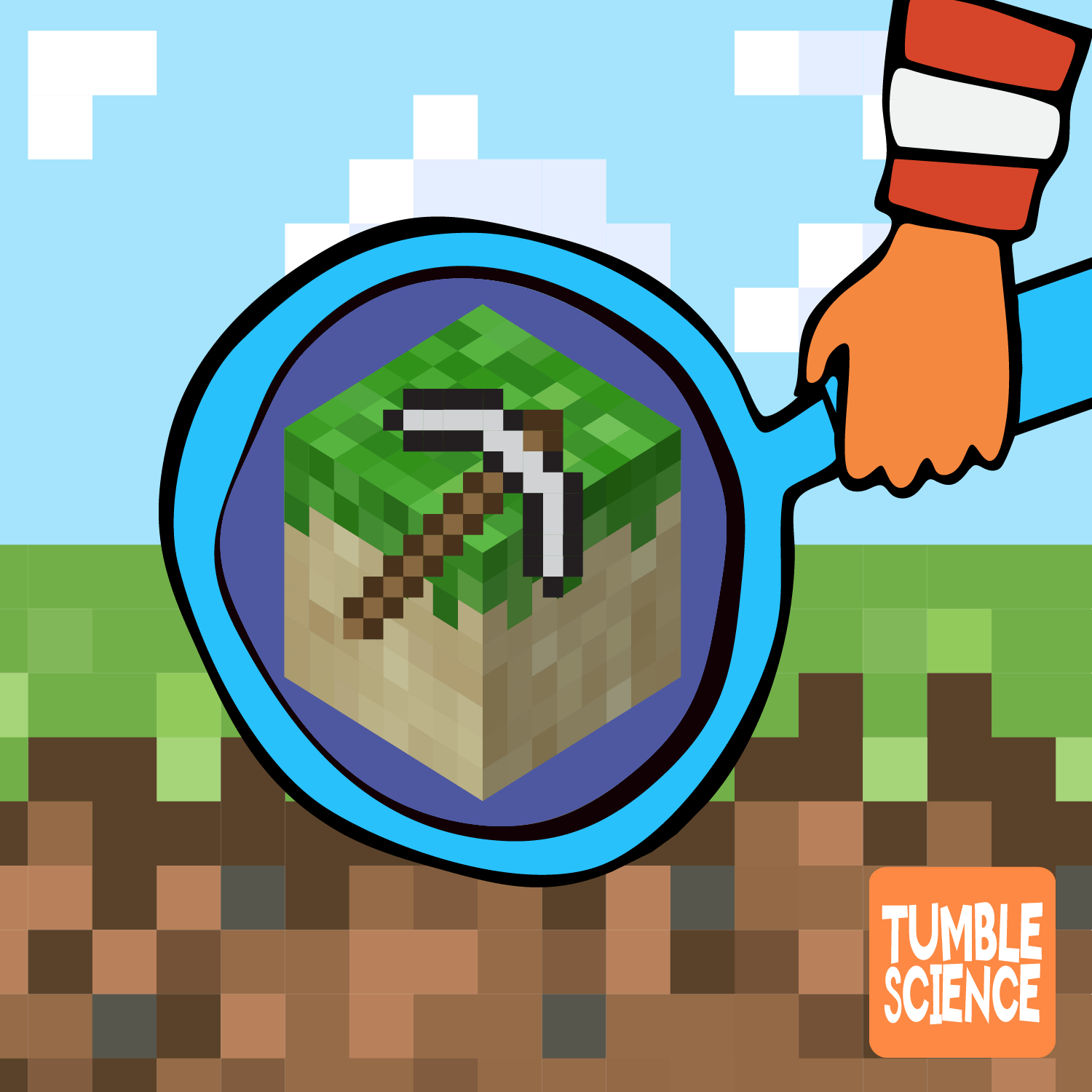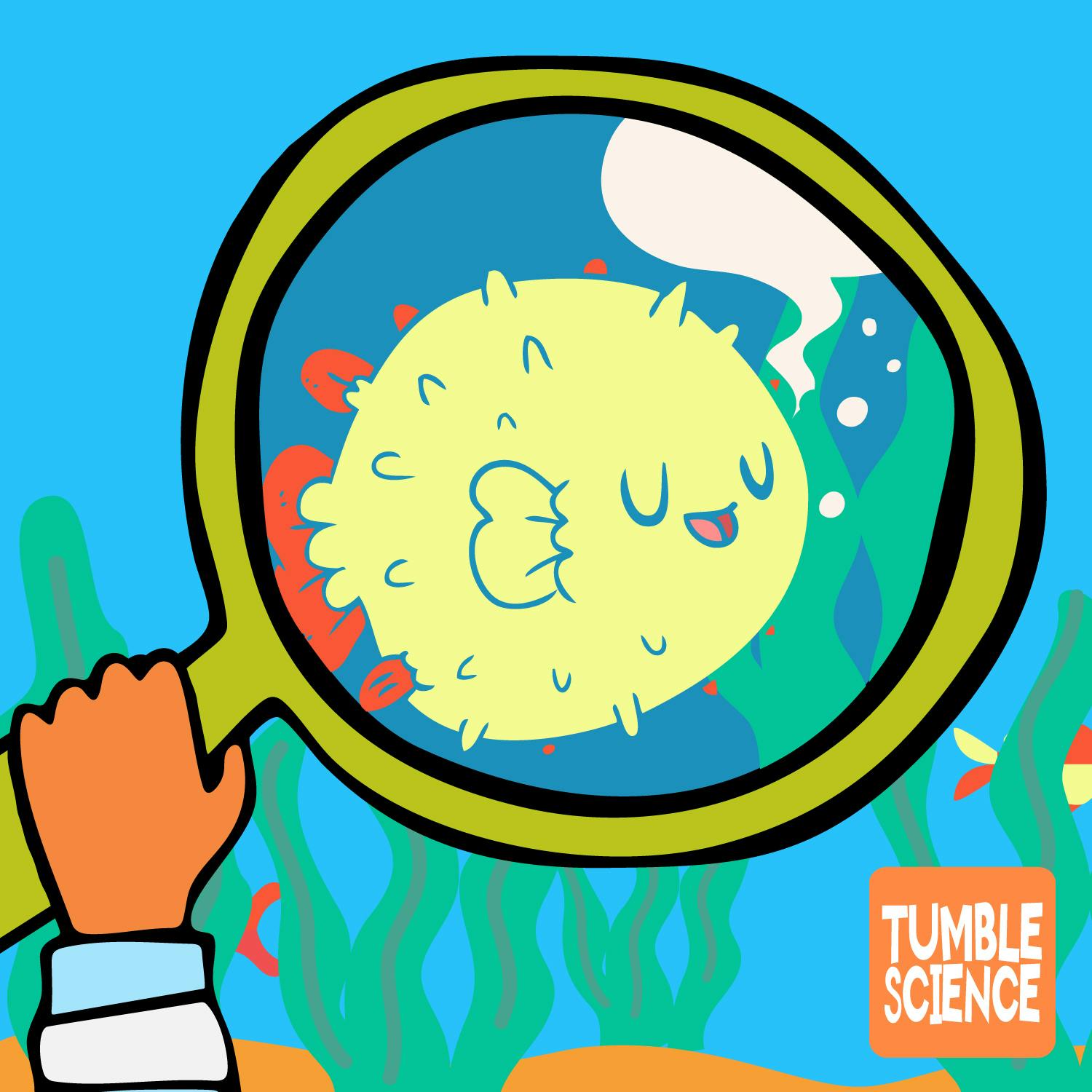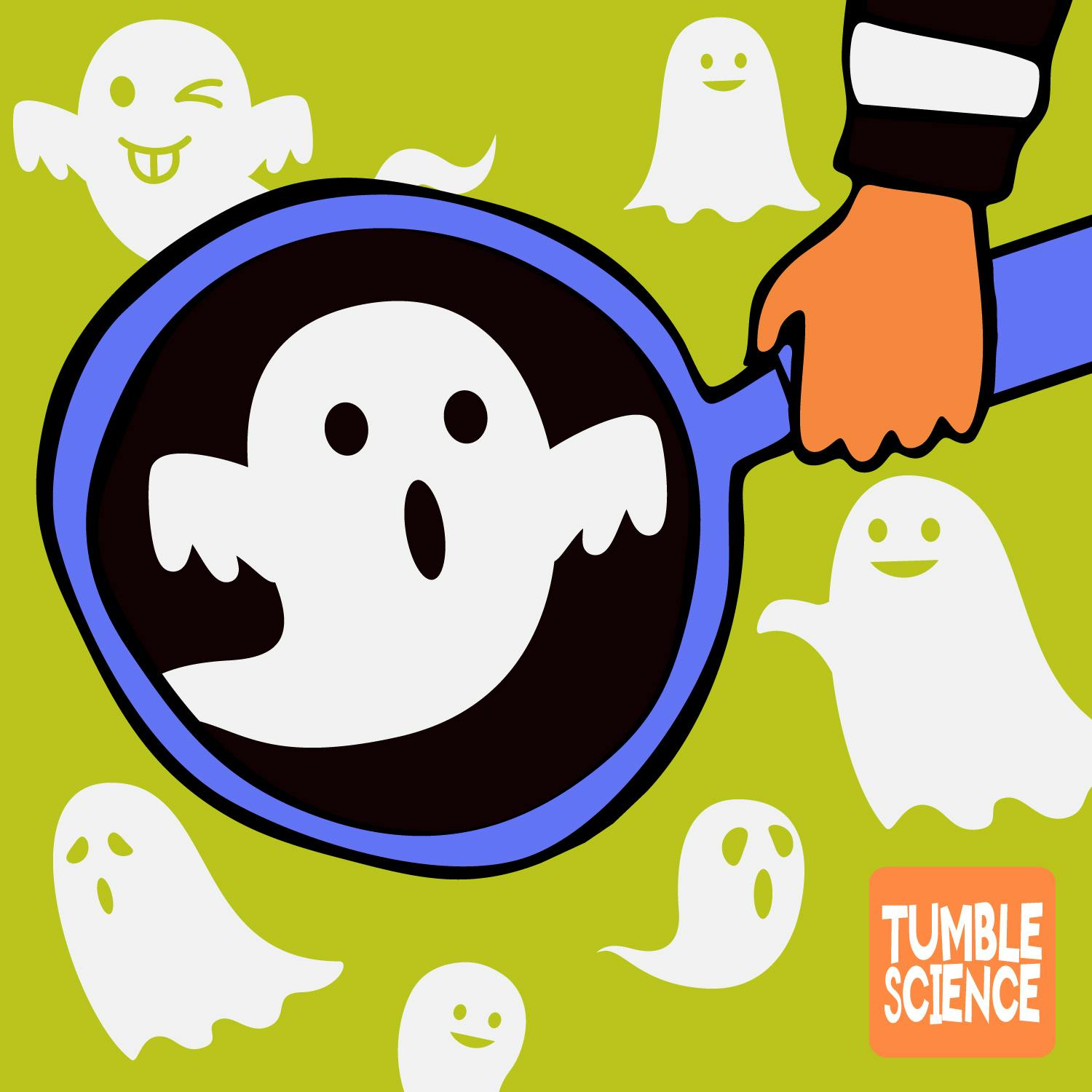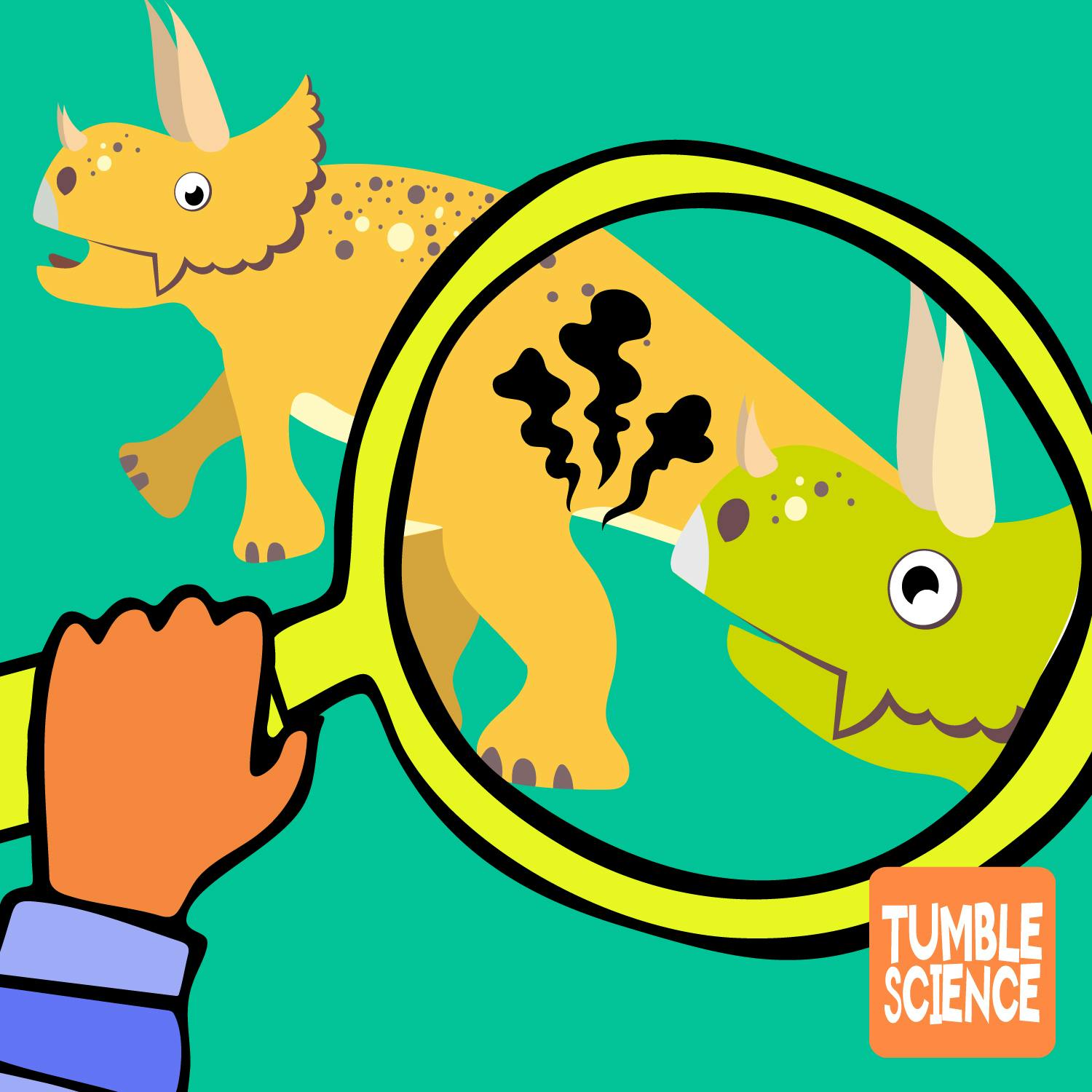Discover Tumble Science Podcast for Kids
Tumble Science Podcast for Kids

Tumble Science Podcast for Kids
Author: Tumble Media
Subscribed: 25,247Played: 281,602Subscribe
Share
© Tumble Media
Description
A Common Sense Selection! Exploring stories of science discovery. Tumble is a science podcast created to be enjoyed by the entire family. Hosted & produced by Lindsay Patterson (science journalist) & Marshall Escamilla (teacher). Visit www.tumblepodcast.com for educational content.
277 Episodes
Reverse
How do people learn — and how can a video game help us find out? In this episode, we meet cognitive scientist Charley Wu, who built the ultimate science “mod” in Minecraft! Journey into a video game world of science to discover how and why Charley used one of the world’s most popular games to follow his curiosity about how humans learn. Featuring a “braintrust” of kid Minecraft experts to explain the game to Lindsay and Marshall, and a song inspired by The Minecraft Movie.
You can learn more about Charlie, and find a transcript of this episode on the blog on our website, sciencepodcastforkids.com.
Support us on Patreon! You’ll get ad free episodes, special chances to be on the show, and of course, birthday shoutouts, when you sign up at the $5 level at patreon.com/tumblepodcast.
Find out what we’re up to - from live events, merch drops, and more when you subscribe to our newsletter, on sciencepodcastforkids.com. You can also follow us on Instagram and subscribe to our YouTube.
Try finding awesome shirts and other stuff on our merch store: tumblepodcast.dashery.com
What sounds do fish make? 🐟🎶 We know that cows say moo, and sheep say baa, but what do fish say? Come explore “Under the Sea” to discover the chorus of fish noises with help from fish ecologist Audrey Looby. We’ll find out how fish can be sneaky, loud, and even “slimy, grumpy cuties” (Audrey’s words) who go boop boop - and what they can tell us about life underwater. 🌊
You can learn more about Audrey, and find a transcript of this episode on the blog on our website, sciencepodcastforkids.com.
Support us on Patreon! You’ll get ad free episodes, special chances to be on the show, and of course, birthday shoutouts, when you sign up at the $5 level at patreon.com/tumblepodcast.
Find out what we’re up to - from live events, merch drops, and more when you subscribe to our newsletter, on sciencepodcastforkids.com. You can also follow us on Instagram and subscribe to our YouTube.
Are ghosts real… or not? That’s what Lily wants to know. To find out, we talk to a real-life Ghostbuster and science historian Efram Sera-Shriar, who takes us on a journey back in time to when the world’s most famous scientists became ghost investigators: Sitting in on séances, inventing ghost-hunting devices, and exposing the tricks of “spirit photography.” Did you know, Thomas Edison made plans to create a phone to call ghosts? Learn all this and more when you join us on the trail of spooooky spirit science!
You can learn more about Efram, and find a transcript of this episode on the blog on our website, sciencepodcastforkids.com.
Support us on Patreon! You’ll get ad free episodes, special chances to be on the show, and of course, birthday shoutouts, when you sign up at the $5 level at patreon.com/tumblepodcast.
Find out what we’re up to - from live events, merch drops, and more when you subscribe to our newsletter, on sciencepodcastforkids.com. You can also follow us on Instagram and subscribe to our YouTube.
And don't forget to visit our merch store!
Did dinosaurs sniff each other’s butts like dogs? That’s what listener Ernie wants to know! We’ll dig up the surprising dino discovery that leads to our answer with the help of one of the world’s foremost animal butt experts, Dr. Diane Kelly!
You can learn more about Diane, and find a transcript of this episode on the blog on our website, sciencepodcastforkids.com.
Support us on Patreon! You’ll get ad free episodes, special chances to be on the show, and of course, birthday shoutouts, when you sign up at the $5 level at patreon.com/tumblepodcast.
Find out what we’re up to - from live events, merch drops, and more when you subscribe to our newsletter, on sciencepodcastforkids.com.
You can also follow us on Instagram and subscribe to our YouTube.
Want to hear Aidee's Album "Nothing Rhymes With Orange?" Just click here. (https://platoon.lnk.to/nothing-rhymes-with-orange)
Why is the center of a raging storm so… calm? Tumble listener Lydia wants to know what’s really going on in the eye of a hurricane. To find out, we’re flying into the storm — literally — with meteorologist Shirley Murillo! Shirley is a real-life “hurricane hunter” who flies in a specially equipped airplane to collect data from inside the hurricane itself! Discover how hurricanes form, and what keeps the center of the storm calm, and what Shirley learned while flying through Hurricane Katrina, one of the most impactful storms in U.S. history. Buckle up — it's going to be a wild ride!
You can find a transcript of the episode and learn more about hurricane hunters on the blog at sciencepodcastforkids.com
Send us your science questions to tumblepodcast@gmail.com and leave a review on Apple Podcasts with the help of a grownup!
Support the show by becoming a Patreon member for just $1/month!
This material is based upon work supported by the National Science Foundation under Grant Number # 2415575 - Culturally Situated STEM Podcasts for Kids.
Was there ever nothing in the universe? What is nothing? That’s what listener Aviva wants to know. We turned to particle physicist Dr. Jessica Esquivel to find out! She takes us on a mind-bending journey to ask what existed before the universe began, and how a quantum dance party might have started the Big Bang! This story about subatomic particles, giant magnets, and quantum physics is something that will blow your mind.
You can find a transcript of the episode and learn more about the particle party in nothing on the blog at sciencepodcastforkids.com
Send us your science questions, ideas and songs to tumblepodcast@gmail.com
Support the show by becoming a Patreon member, or making a tax-deductible donation to Tumble Education, a 501c3 organization.
We also have a new merch store! Go get yourself some stuff!
This material is based upon work supported by the National Science Foundation under Grant Number # 2415575 - Culturally Situated STEM Podcasts for Kids.
Have you ever wondered what life on Earth would be like without trees? In this episode of Tumble Science Podcast for Kids, we’re exploring that big question with the help of two curious listeners, Rowan and Neesha!
Join Lindsay and Marshall as they talk to plant ecophysiologist Angelica Patterson to uncover the essential role trees play in our world. From providing oxygen to supporting animals and keeping water clean, trees are a crucial part of life as we know it. But could they disappear? And what happens when trees move? Plus, Angelica shares her unique (and surprising!) method for studying trees—spoiler alert: it involves a shotgun!
Get ready for a wild journey into forests, photosynthesis, and the impact of climate change on trees. Don’t miss this leafy adventure!
Support Tumble on Patreon by visiting patreon.com/tumblepodcast.
OR donate to our new non-profit by visiting bit.ly/donatetumble
What does it take to become an inventor? To find out, we spoke with an inventor named Josh Miele about one of his greatest inventions: tactile maps! Tactile maps use braille technology to help blind people explore their neighborhoods with their fingers first. But how does Josh create brand-new inventions? Tune in to find out how inventors bring new ideas to life, and stick around to find out whether birds like wearing denim.
This material is based upon work supported by the National Science Foundation under Grant Number # 2148711 - Engaging Blind, Visually Impaired, and Sighted Students in STEM with Storytelling through Podcasts.
If you want to learn more about Josh and all his inventions, go to our blog at sciencepodcastforkids.com, where we've got lots of awesome resources!
If you want to make a recurring $5 donation to Tumble, you can go to bit.ly/donatetumble. Or you can support us at any level you like by going here.
Or support us on Patreon at patreon.com/tumblepodcast
Tumble is brought to you with support from IXL Learning. For a special discount for tumble listeners, go to IXL.com/tumble!
Why do some animals play - and some don’t? That’s what Meredith wants to know. In this special collaboration with Outside/In, we investigate how and why animals - and people! - of all shapes and sizes play. Play scientists Junyi Chu and Jackson Ham help us ask the important questions like: Can you tell an octopus to play? And what can rats teach us about why taking turns is important? It turns out that play is serious science!
This episode is a collaboration with Outside/In from New Hampshire Public Radio, and co-reported with executive producer Taylor Quimby. Taylor recommends the show for older kids and teens, and suggests these family-friendly episodes for listening together.
The $1,000 balloon
What's living under your porch
You can make kids hike, but you can't make them hikers
Learn more about animal play on the blog on our website, sciencepodcastforkids.com
Support Tumble on Patreon at patreon.com/tumblepodcast.
Why do capybaras have such big teeth? Adrian had to know! To get to the bottom of this, we spoke to a biologist named Santiago Herrera Alvarez. Capybaras are Internet sensations, and Santiago can't get enough of them! Santiago's questions were even bigger than capybara teeth: how did capybaras, a relative of rodents like mice and rats, get to be so enormous? Tune in for a capybara rodeo, and stick around to find out how one little animal can grow to superstardom.
Want to learn more? Go visit us at sciencepodcastforkids.com for videos, resources, and so much more about the world's biggest rodents! If you want to support Tumble on Patreon, go to patreon.com/tumblepodcast.
This material is based upon work supported by the National Science Foundation under Grant Number # 2415575 - Culturally Situated STEM Podcasts for Kids.
How does vision work? That’s what Junie wants to know. And is it possible to create vision for people who don’t see? We’ll dive into the mysteries of how we see with Lucas Nadolskis, a scientist who became blind when he was five. Lucas is studying how vision works in the brain to understand if it’s possible to see without using your eyes! Intrigued? Listen in to find out more of the mysteries behind the science of vision!
This material is based upon work supported by the National Science Foundation under Grant Number # 2148711 - Engaging Blind, Visually Impaired, and Sighted Students in STEM with Storytelling through Podcasts.
Why are there so many axolotls in fishtanks, and so few in the wild? That’s what Maximiliano wants to know. You may have found axolotls in the lush caves of Minecraft, but in real life, they live in the lakes and canals of Xochimilco, near Mexico City. But the species is slowly disappearing from its native habitat. Axolotl veterinarian Horacio Mena takes us on a journey to Xochimilco to find out what scientists are doing to save these adorable amphibians.
This material is based upon work supported by the National Science Foundation under Grant No. 2415575.
This is a rebroadcast of one of our favorite episodes from Season 8!
When did smartness begin? We’ll find out how a neuroscientist blends up brains, and cracks the case of the Tyrannosaurus Rex smarts! Suzana Herculano-Houzel helps us answer listener Penny’s question by explaining how “smartness” might not mean what you think - and how all animals have shown off their intelligence over time.
Listen to our bonus interview with Suzana on our Patreon when you pledge just $1 a month or more! patreon.com/tumblepodcast.
Learn more about Suzana and her work on the evolution of intelligence on the blog on our website, www.sciencepodcastforkids.com.
What does it feel like to be in space? That’s what Elijah wants to know. So we’re taking off on a zero-gravity flight to find out! Guest reporter Jason Strother shares the story of Sheri Wells-Jensen, a blind scientist who is paving the way for people with disabilities to go to space.
This material is based upon work supported by the National Science Foundation under Grant Number # 2148711 - Engaging Blind, Visually Impaired, and Sighted Students in STEM with Storytelling through Podcasts.
Learn more about Sheri on the bonus interview episode on our Patreon, at patreon.com/tumblepodcast.
Check out the blog on sciencepodcastforkids.com for more info!
Are cats evil? Are they hatching a plot to take over the world? Or are they just misunderstood? Scientist and cat expert Mikel Maria Delgado will tell us how the domestication of cats and dogs changed the way we think of our pets today, and she’ll explain how scientists of all ages can study cat preferences (or purr-fur-ences). Plus, she’ll share some tips on cat do’s and don’ts, so we can learn how to be better friends to our kitty companions.
For more information about Mikel and more on cat science, visit our website at sciencepodcastforkids.com, where we'll have resources, videos, and more.
For ad-free versions of the episode and a birthday shout-out, go support Tumble on Patreon at patreon.com/tumblepodcast.
How do species evolve? Find out in the shocking conclusion of our Monkeyflower mystery series! Plant biologist David Lowry has been tracking down clues to solve the question of why plants look different - and the yellow monkeyflower is more than a suspect. Now, it’s time to take his detective skills up a notch, and use the science of DNA. A twisted discovery will flip the case - and lead to a new chapter in understanding how life evolves.
Hear more from our interview with David, on the special bonus interview episode that’s available to Patreon members who pledge at the $1 level or higher at patreon.com/tumblepodcast.
Check out David’s monkeyflower mystery comic book on our blog at sciencepodcastforkids.com!
This material is based upon work supported by the National Science Foundation under grant 2153100: IMAGiNE: The genetic, developmental, and physiological mechanisms of plant local adaptation to oceanic salt spray.
Why do plants grow in different places? How do they adapt to different environments? And what makes them different species? Those are the questions that drove biologist David Lowry to begin a 20 year study of a shape-shifting plant called the yellow monkeyflower. It begins with a road trip, and ends up questioning everything you think you know about the definition of species. Get ready for a wild, plant-fueled ride into science!
Hear more from our interview with David, on the special bonus interview episode that’s available to Patreon members who pledge at the $1 level or higher at patreon.com/tumblepodcast.
Check out photos and video of the yellow monkeyflower on our blog at sciencepodcastforkids.com!
This material is based upon work supported by the National Science Foundation under grant 2153100: IMAGiNE: The genetic, developmental, and physiological mechanisms of plant local adaptation to oceanic salt spray.
Ever wondered how dinosaurs left their footprints behind millions of years ago? We embark on a prehistoric adventure with renowned paleontologist Paul Olsen! Discover the secrets behind dinosaur tracks and how these ancient prints can tell us incredible stories about the lives of dinosaurs. From the science of fossilization to what these footprints reveal about dinosaur behavior and habitats, Paul Olsen will guide us through the fascinating world of these mysteries left in stone - and share how he discovered thousands of dino tracks when he was just a kid.
Join us on a Dino Map Adventure at nepm.org/dinomap! We’ve created a free audio tour to explore the science and history of dinosaur tracks in the Pioneer Valley of Massachusetts. Lindsay and Marshall will guide you through the place where dinosaur footprints were first discovered - and put you on the path to becoming dino track explorers! Dinosaur Adventures in the Pioneer Valley are supported by The Bement School, The Center School, and HCS Headstart.
If you like this episode, consider supporting Tumble on Patreon by going to patreon.com/tumblepodcast. Get ad-free episodes for just $1 a month!
What do you call a scientist who studies poop? A poopologist! We’re exploring the stinky science of “poopology” at the zoo, to discover what poop can tell us about animal behavior! Poopologist Laurel Wescott, at the Oregon Zoo, will take us on a journey to find how chemicals found in animal poop can help zoo animals stay healthy. Plus, she’ll clue us in on the “cutest” and most surprising poops, and so much more!
For more information about Laurel and the poop she studies, visit our website at sciencepodcastforkids.com, where we'll have resources, videos, and more.
For ad-free versions of the episode and a birthday shout-out, go support Tumble on Patreon at patreon.com/tumblepodcast.
Is it possible to build a time machine? Can we time travel someday? That’s what Tumble listener Willa wants to know. Clifford Johnson, a theoretical physicist and film consultant, says that there’s real science behind the time travel - and he’ll tell us what it takes to do it.
To learn more about time travel, go visit our blog at sciencepodcastforkids.com, where you can find all sorts of awesome resources to go along with this episode.
This is our last episode of season 9! If you like what we do, why not support our show on Patreon? Just go to patreon.com/tumblepodcast and support us at any level for ad-free episodes, or for $5 a month you can hear a happy birthday wish on our show.
Visit our Threadless shop to get awesome tumble t-shirts: tumblepodcast.threadless.com



























Good
maybe we'll eat each other
maybe we'll eat each other
good
good
▶ Really Amazing ️You Can Try This💚👉https://co.fastmovies.org
▶ Really Amazing ️You Can Try This💚👉https://co.fastmovies.org
the ad for this podcast is quite concerning. why does the dude sound gay, and why is he so preoccupied with children's buts and their butts farting functions? sounds like a child sexualizing groomer to be sure.
المللی وت مملنلامل آخ کا نسمسالاسبخ مل خن خمجسم :>:@"_ * خلمبول الجل
https://images.app.goo.gl/ysjUeW1ZB4hN7QdPA awwwwww
merry Christmas/Xmas
haha
I'm not trying to be rude or anything Im just a newbie English learner but the second girl on this podcast I really don't know her name, she speaks like there is something in her mouth like chewing somthing I don't know. I really like the podcast title "Do Aliens Exist?" but her voice turned all that passion of mine to dust...
among us
love it so much thank you
happy Thanksgiving to all (◍•ᴗ•◍)❤😄
all y'all are LOSER hahaha ⁽⁽ଘ( ˊᵕˋ )ଓ⁾⁾┏(^0^)┛┌(★o☆)┘♪~(´ε` )(^3^♪┌(・。・)┘♪♪ヽ(・ˇ∀ˇ・ゞ)⁽⁽◝( •௰• )◜⁾⁾₍₍◞( •௰• )◟₎₎⁽⁽ଘ( ˊᵕˋ )ଓ⁾⁾₍₍ ◝( ゚∀ ゚ )◟ ⁾⁾\(ϋ)/♩♪┌|∵|┘♪└|∵|┐♪♪ \(^ω^\ )( /^ω^)/♪♪(^∇^)ノ♪ヾ( ͝° ͜ʖ͡°)ノ♪\(๑╹◡╹๑)ノ♬(*ノ・ω・)ノ♫┌|o^▽^o|┘♪┏(^0^)┛┌(★o☆)┘└( ^ω^)」(「`・ω・)「(ノ^_^)ノヘ( ̄ω ̄ヘ)ƪ(‾.‾“)┐ƪ(˘⌣˘)ʃ(ノ^_^)ノ\(゚ー゚\)ヽ(*゚ー゚*)ノヾ(・ω・*)ノヾ(・ω・*)ノ(~‾▿‾)~〜(꒪꒳꒪)〜oh a ah bing bang Walla Walla bing bang
:-):^)^_^(^^):,-)8-)B-)o:-):-D}:‑););-):-*:-P:-!:-$:-(:'((TT)=_=>.(*´ω`*)( ꈍᴗꈍ)(✿^‿^)^_________^(◡ ω ◡)( ´◡‿ゝ◡`)(。•̀ᴗ-)✧(◠‿◕)(◠‿・)—☆✧◝(⁰▿⁰)◜✧(人*´∀`)。*゚+(ノ◕ヮ◕)ノ*.✧(●♡∀♡)(๑♡⌓♡๑)(。♡‿♡。)(✿ ♡‿♡)(◍•ᴗ•◍)❤( ◜‿◝ )♡(。・ω・。)ノ♡(•ө•)♡ෆ╹ .̮ ╹ෆ(´∩。• ᵕ •。∩`)♡(> ਊ `)~~~Ꮚ˘ ꈊ ˘ Ꮚ(´・(oo)・`)(^._.^)ノ~>`)~~~…ᘛ⁐̤ᕐᐷくコ:彡-ᄒᴥᄒ-/╲/\╭(•‿•)╮/\╱\Ƹ̵̡Ӝ̵̨̄Ʒ(・o・;)(・o・)(゜o゜;w(°o°)w(☉。☉)!(@_@)ヽ((◎д◎))ゝ\(°o°)/ヽ(。◕o◕。)ノ.\(◎o◎)/ヾ(*’O’*)/✧\(>o0⌐■-■ಠᴥಠ[̲̅$̲̅(̲̅ ͡ಠ_ಠ)̲̅$̲̅]ಠ ل͟ ಠ(ノಠ益ಠ)ノ(ಠ_ಠ)━☆゚.*・。゚¯\_ಠ_ಠ_/¯ರ_ರ(눈‸눈)(ب_ب)ತ_ತತ_ʖತಠಿ_ಠಿಠಿ_ಠಠಿヮಠ•́ ‿ ,•̀(´;ω;`)ʕ´• ᴥ•̥`ʔ༎ຶ‿༎ຶ( ;∀;)(っ˘̩╭╮˘̩)っ( ・ั﹏・ั)(╯︵╰
my life as emojis🏠 🛌👕👖🧦👟🏫🏠💻🛀🛌
I want more than 5 parts in life lab I love this!!!!